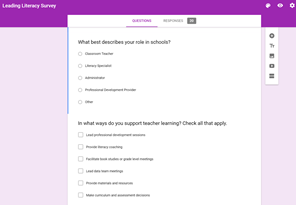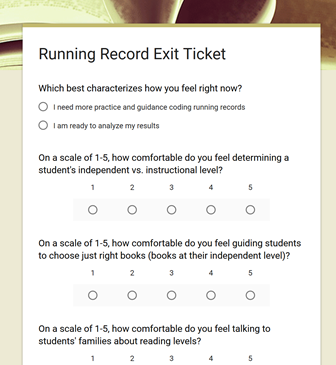That all changed when I arrived.Imagine my surprise when I realized my audience was not a group of reading coaches, but seniors who listen to students read. While they were very attentive and polite, the content I shared with them was not targeted to their needs or their technology prowess. They were not teaching reading, but listening to reading. They were not instructing, but connecting with kids.
I could have crafted a very different presentation that would have better prepared them for their experiences ahead, had I known more about them. I left that session feeling very defeated and apologetic for not knowing my audience. From then on, I vowed to get to know my audience’s needs and ensure a worthwhile and meaningful experience for participants through all phases of professional learning.
Technology can help us do just that and digital surveys are the perfect way to begin. We can create simple entrance tickets, exit tickets and even survey teachers at the beginning and end of the year to support reflection on the coaching role overall.
First, let’s talk about entrance tickets:
Your entrance tickets can begin long before your session even starts, in the planning process. Survey teachers on the kinds of topics they would like to explore in your professional development sessions together over the coming school year. Ideally, teachers would link their names to their responses so you can learn more about each teacher and craft a professional development plan that meets their needs. Yet, anonymity can be powerful and teachers might honestly respond more readily if they can do so anonymously.
Next, use digital tools to create quick and easy entrance tickets at the start of your session to give you helpful information to immediately inform your work.
You might ask teachers to rate their understanding of a topic, such as running records, or to submit a question they hope is answered within the session. If you use a tool like Google Forms, results can be aggregated and displayed immediately for group reflection.


Now, let’s think through exit tickets:
Exit tickets should focus on the content learned during the session, ask for feedback on the usefulness of the activities or request information about how teachers might use their new knowledge in the classroom. Teachers can also submit any lingering questions they have so that you can address them in a follow-up email or shared session notes.

Each piece of information gathered from teachers can inform your practice and ensure your collaborations are authentic, relevant and timely. You can use this information beyond your professional development sessions and in your individual coaching as well: suggest books, mentor texts, articles, websites and even other teachers that could fuel teacher’s interests and inquiries in meaningful and authentic ways. These connections pave the way for more sustained, intentional and collaborative work together.
But that’s not all. Let’s talk about yearly reflections to help teachers celebrate their learning AND think forward about the coaching role, too.
Digital surveys are the perfect way to survey teachers at the beginning and end of the school year to support your overall vision for the coaching role and your yearly goals, too. Here are some possible questions:
Beginning of the Year:
End of the Year:
Now, these are only possibilities and we certainly would not ask them all. Choose questions based on the work you’ve done together and if you can, include choices for teachers to choose from to make the survey even easier to complete. The more teachers who complete the survey, the more information you have to inform your coaching.
Prizes don’t hurt, either. =)
Now, let’s think through exit tickets:
Exit tickets should focus on the content learned during the session, ask for feedback on the usefulness of the activities or request information about how teachers might use their new knowledge in the classroom. Teachers can also submit any lingering questions they have so that you can address them in a follow-up email or shared session notes.
Each piece of information gathered from teachers can inform your practice and ensure your collaborations are authentic, relevant and timely. You can use this information beyond your professional development sessions and in your individual coaching as well: suggest books, mentor texts, articles, websites and even other teachers that could fuel teacher’s interests and inquiries in meaningful and authentic ways. These connections pave the way for more sustained, intentional and collaborative work together.
But that’s not all. Let’s talk about yearly reflections to help teachers celebrate their learning AND think forward about the coaching role, too.
Digital surveys are the perfect way to survey teachers at the beginning and end of the school year to support your overall vision for the coaching role and your yearly goals, too. Here are some possible questions:
Beginning of the Year:
- What are you most looking forward to in the coming school year?
- What professional goals have you set for yourself?
- What do you hope for your grade level team?
- What kind of professional support do you want and wish for in the coming year?
- What’s one question about teaching you hope to explore this year?
- What’s one thing you hope your coach can offer you this year?
- What’s your vision for the coming school year?
End of the Year:
- What’s one memorable moment you are taking with you from the school year?
- What professional goals have you accomplished?
- What has your grade level team accomplished this year?
- What kind of professional support do you wish you had over the past year?
- What’s one question you answered about teaching over the course of the year?
- What’s one thing you found helpful in my coaching this year?
- How did you bring your vision to life in the past year?
- How will you take care of your teaching spirits over the break?
Prizes don’t hurt, either. =)
What questions are on your digital surveys for teachers? Share in the comments below!





Add your comment